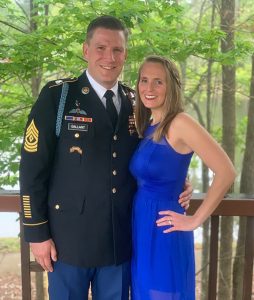Longtime Army Infantryman Readies for Second Career in Social Work
By David Miller
April 28, 2020

Master Sgt. William “Bill” Gallant and wife, Jessica.
As Army Master Sergeant William “Bill” Gallant was nearing completion of his undergraduate degree in criminal justice, the Army required he take an academic aptitude test to determine his best fit for graduate school.
The results weren’t what he expected.
“The number one hit for me was social work,” Gallant said. “When I saw that, I thought, ‘there’s no way I’m going to be the guy that takes children away from their families.’”
A longtime infantryman, Gallant has served nine deployments in both Iraq and Afghanistan. And while he was unsure of a career in social work, he was keen for a new academic direction after concluding that a future in working in criminal justice was, for him, “the wrong side of the spectrum.”
“It just seemed like planning and conducting law enforcement doesn’t address the social issues that lead to crime,” Gallant said.
Then, Gallant read, “Days in the Lives of Social Workers,” a deep dive into the careers of social workers in more than 50 different work settings. The book, considered an essential read for those considering majoring in social work, broadened Gallant’s perspective of the profession, and its many career paths.
“A lot of the [stories] really spoke to me … things I was already interested in, like social work with older adults and chemical dependency, and the relatively new field of adventure-based counseling” Gallant said.
Gallant, a Dover, Delaware native who was stationed at Fort Benning, Georgia at the time, soon enrolled in the MSW program at the University of Alabama School of Social Work’s two-year, distance track. Gallant would complete field placements in a youth detention center in Columbus, Georgia and, this spring, at an assisted-living facility in El Paso, Texas after transferring to nearby Fort Bliss.
Additionally, Gallant’s last 12 months of MSW coursework and placements have run concurrently with training at the United States Army Sergeants Major Academy in El Paso.
Gallant will earn his MSW from UA in May and finish the Sergeants Major Academy in June.
“Getting used to the daily requirements, the rhythm of the academy, and taking the four classes in the fall were pretty challenging,” Gallant said. “There were some nights when I didn’t sleep.”
“Both placements were, by far, the most challenging parts of completing my MSW,” he added. “But I want military members to know that requirement is 100 percent achievable. In both cases, my faculty liaison was able to help me find something with flexible hours that met my scheduling needs.”
After completing the Academy coursework in June, Gallant along with his wife Jessica and daughter Jilian will move to Fort Carson, Colorado, where he will seek licensure and hopefully begin volunteer work. It’s unclear how he may apply his MSW degree while still serving in the Army, as he’s unsure of the requirements for a battalion operations sergeant major with an armored brigade combat team.
Still, Gallant is eyeing a full-time future in clinical social work in as early as two years, should his retirement be approved by the Army.
Gallant will undoubtedly be ready for that transition after numerous deployments and assignments during his 18-year Army career. Additionally, his placement at Ambrosio Guillen Texas State Veterans Home this spring provided a unique blend of social work-specific experiences and challenges once the COVID-19 pandemic took hold and forced UA students to complete their field assignments remotely.
Gallant said the veterans’ home “was in widespread panic” as the rates of infection grew at other facilities, and as nurses and social services personnel realized the acute vulnerability of their 178 residents. Gallant and two full-time employees helped maintain daily operations and communicated plans with families.
“Social services did a great job of contacting families and setting up programs to mitigate impacts of families not being able to visit loved ones,” Gallant said. “Once we transitioned to the remote placement, I focused on doing things to help my field instructor at the facility once business returns to usual.”
Gallant will be eligible for military retirement in June 2023, when he intends to transition to social work full time.